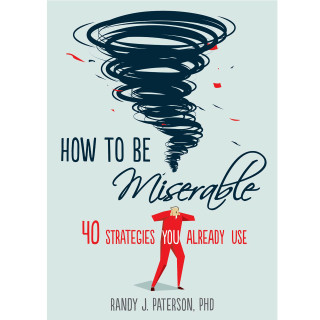3 Ways to Make Yourself Miserable (by Doing What You Already Do)
The psychologist who wrote How to Be Miserable: 40 Strategies You Already Use points out the way we defeat our own happiness—without even realizing it.

Photo: soberve/Getty Images
1) The Misery-Inducing Tactic: Keep Well Informed
It can be challenging to maintain a truly negative point of view in light of the intrusion of sunny days, welcoming friends, buses that occasionally run on time, and savory bagels. The task may prove to be more than you can manage.
What if you had help? What if you could recruit a staff of thousands to scour the globe, searching for every negative, misery-inducing thing that happens? They could record these events, photograph them and then replay them before your eyes.
Well, you're in luck. You do have such a staff. The news media will work tirelessly on your behalf to find and report on every disaster, every capsized refugee boat, every failed bridge, every detonated bomb. Television news will then play these accounts for you over and over again, often while you are attempting to eat dinner. So monitor your news consumption for a week. Make a note of all your regularly used sources: newsprint, internet news, radio, late-night news summaries. Televised news at the gym, bank, elevator, subway or at home. Total it all up. Then strive to increase your exposure next week.
2) Misery-Inducing Tactic: Blame Inward, Give Credit Outward
We get a letter from the government informing us that our tax return was incorrect and that we owe them another $1,252. This isn't a random event; something brought it about. So...how did that happen?
Renowned psychologist Martin Seligman focused for much of his career on the sources of lowered mood. He and his colleagues studied people's ideas about the causes of different types of events and categorized their attributions:
• Internal or external. An internal attribution attributes the primary cause to oneself: I was the one who made the mistake on the tax form. An external attribution emphasizes other factors: The government deliberately makes these forms hard to understand.
• Global or specific. The attribution might generalize beyond the situation at hand (The government never cares about the people who have to fill in its forms) or could stay with the individual event (Whoever wrote that line of the tax guide wasn't thinking clearly).
• Stable or unstable. A stable cause is unlikely to change over time: I'm an idiot at filling in these forms—always have been. An unstable one is more situational and so less likely to recur: I was stressed out when I did my taxes because the parakeet was sick.
Happy people tend to show a degree of balance in their attributional style. For example, an employee might receive the annual review of her work. Good or bad, she will likely attribute the details to a mix of her own performance (They're right: I did work hard this year, and I did make that mistake on the Smith account) and externally to the job or the evaluator (Joan helped me a lot on the Chan file, so I can't take all the credit, and the lease foul-up was partly the property manager's fault).
The bias seems to be stronger (and flipped to the negative), however, in the depressed. The attributions made by people in deepest misery tend to depend very much on whether the event is positive or negative. Positive events, like getting a promotion, scoring well on a test or learning to water-ski, most often receive external attributions. The miserable will say that the task was just easy or that they were lucky
In other words, the positive outcome has nothing to do with them. Although they might get a mild lift, the attributions for welcome events tend to be external (This says nothing about me), specific (Water-skiing is the only thing I do right) and unstable over time (Next time, I'll probably break a leg).
Negative events, on the other hand, tend to be given attributions that are internal, global and stable. A fender bender in the supermarket parking lot, for example: I'm a bad driver. Always have been. Getting dumped by a partner: When people get to know me, they don't want me. I'm unlovable. These unwelcome events are viewed as being all about the person.
First, check out your existing style: Think of three positive and three negative events that have happened in the past month. Write them down. For each, ask how that happened? Write down the first explanation that comes to mind.
Then, take a look at your attributions. Internal or external? Global or specific? Stable or unstable? You're looking for a pattern that separates the positives from the negatives. Misery is best induced with external-specific-unstable for positives and internal-global-stable for negatives.
3) Misery-Inducing Tactic: Set VAPID Goals
One of the best ways to be miserable is to relinquish your goals altogether, thus becoming utterly directionless. But if, like many people, misery is not your only goal, then you can dissatisfy yourself with the way you approach your various missions.
The cause of misery is well served by failure. So it's important to ignore the so-called SMART rules, which dictate that effective immediate goals should be:
• Specific. You know how you will accomplish the task. "Take the number 19 bus to the Aquatic Center."
• Measurable. You will know whether or not you have succeeded. "Get in pool and swim one lap."
• Action-oriented. Your goal is to do something, not to think or feel a particular way. "Swim the lap—even if I hate it and think my bathing cap looks stupid."
• Realistic. You already know you can do it, even if you don't feel particularly well. "I could swim 20 laps not long ago; I'm absolutely certain I can swim at least one."
• Time-defined. You have a clear time frame for completion of the goal within the coming week. "On Thursday evening."
These rules make success more likely, resulting in increased motivation and interest in the succeeding steps. This only means that you will be more likely to get up off that comfortable couch and continue working on your project. Instead, make all of your immediate goals VAPID:
• Vague. You should be unclear how you are going to complete the goal. If you want to cross-country ski, you should forget all about looking into lessons, thinking about how to get there or ensuring you have the right clothing.
• Amorphous. The finish line for your immediate goal should be indistinct so your depressive self can disqualify any progress you have made. Setting a goal to "work on the back garden," for example, allows you to criticize yourself for not finishing everything, thus eliminating any of the satisfaction you might otherwise feel.
• Pie in the sky. Indulge your innate ability to overestimate what you can do. Say that today you will paint the entire house or revamp your company's finances. With the ensuing failure, you will be able to beat yourself up about your incompetence.
• Irrelevant. Tell yourself that if you achieve your ultimate goal of overcoming social anxiety, you will once again be able to visit your bank. You should therefore lock yourself at home studying investment strategy as a "necessary" prerequisite.
• Delayed. Avoid setting a specific time for the completion of your goal. Instead, resolve to get to work the moment you "feel like it." Because it is vanishingly unlikely that you will ever feel like re-caulking the bathroom tile, you can ensure that it will never be done.

This is an adapted excerpt from How to Be Miserable: 40 Strategies You Already Use. To read the other 37 strategies—and laugh a little more—consult the full book.
Want more stories like this delivered to your inbox? Sign up for the Oprah.com Spirit Newsletter!



